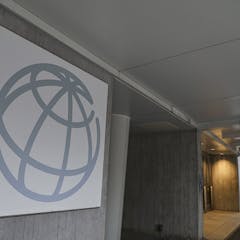
Articles on Bretton Woods
Displaying all articles

The World Bank and IMF need to continue evolving if they are to remain fit for purpose in the 21st century.

Thirty years ago the World Bank recognised that its position was untenable. It put in place mechanisms to make the bank more accountable to ordinary people.

Ghana hasn’t been able to withstand economic shocks or manage its debt because it hasn’t dealt with structural economic problems.

This is the first time a world currency has been pegged to gold since the Bretton Woods system ended in 1971.

Nixon’s decision left the IMF without a clearly defined role. Under the leadership of the industrialised countries, it began to fashion a new more intrusive and ideological role.

the International Financial Conference in Brussels in 1920 hoped to reset the global economic order after a disastrous world war and pandemic. It hold lessons for leaders today.

Stand by for cryptocurrencies 2.0.

The IMF has increasingly turned its focus to growing inequality worldwide. Ironically, research shows that policy reforms it mandated exacerbated income inequalities.

The World Bank has changed direction. It won’t be giving up on public funding, but it will increasingly be trying to attract private investors to developing countries.

Where now for one of the great emblems of post-World War II global co-operation?

The Japanese attack on a US naval base on Dec. 7, 1941 set in motion a series of events that transformed the United States into a global superpower. Will Donald Trump bring that era to an end?

The BRICS bank is positioning itself to play a significant role in those areas in which the international financial institutions are seen to have failed.

No election in recent times has so clearly presented American voters with such a stark choice when it comes to U.S. foreign policy. A guide to the major differences.

South Africa’s finance minister delivered a good mix of macro and micro-economic strategies to ensure the country survives economic uncertainty, restores confidence and achieves some growth.

The global recognition of BRICS – Brazil, Russia, India, China and South Africa – has not only led to their greater global political influence, but also reinforced their regional leadership.

To understand this week’s G20 Summit being held in Brisbane, Australia, and measure its success, requires a sense of the history of economic crisis and change. Recurring crises have shaped global institutions…

Could history one day judge the latest BRICS summit as significant as the Bretton Woods conference of 1944? That is the hope of leaders from Brazil, Russia, India, China, and South Africa as they meet…
